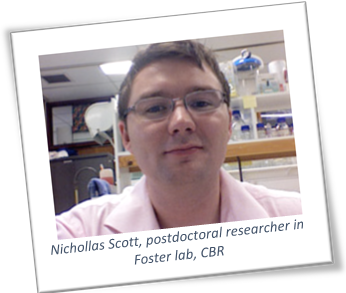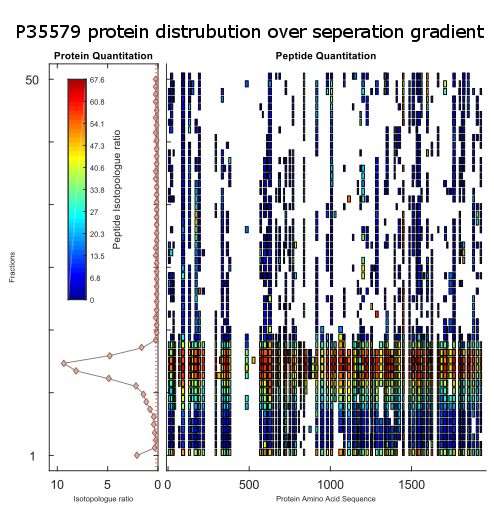 By Tara Fernandez, PDF in Conway Lab, CBR
By Tara Fernandez, PDF in Conway Lab, CBR
Proteins represent a cardinal biomolecule in living systems and understanding their properties is critical for a myriad of biomedical applications. Resultantly, the field of proteomics research is progressing at a rapid pace, involving a vast array of continually evolving technologies. Nichollas Scott, Postdoctoral Fellow at the CBR and the Centre for High-Throughput Biology at UBC, is working at the forefront of these emerging analytical tools for proteomics studies. With a passion for bioinformatics and protein characterization, Nichollas is dedicating his career to creating novel strategies to uncover the intricacies of protein structure and function.
 Nichollas’ curiosity for the biological mechanisms of protein modification led him to his current research path, beginning with a PhD project at the Cordwell Laboratory at the University of Sydney, Australia. His research focused predominantly on glycosylation, or the attachment of sugars to a target protein, in various bacterial systems. In particular, he explored an innovative approach for concentrating low-abundance proteins with mass spectrometry to study glycosylation in pathogenic bacteria, such as Campylobacter jejuni – a leading cause of human gastroenteritis globally.
Nichollas’ curiosity for the biological mechanisms of protein modification led him to his current research path, beginning with a PhD project at the Cordwell Laboratory at the University of Sydney, Australia. His research focused predominantly on glycosylation, or the attachment of sugars to a target protein, in various bacterial systems. In particular, he explored an innovative approach for concentrating low-abundance proteins with mass spectrometry to study glycosylation in pathogenic bacteria, such as Campylobacter jejuni – a leading cause of human gastroenteritis globally.
Among the highlights of Nichollas’ PhD project was the development of efficient proteomic workflows for investigating changes in bacterial proteins. Effectively detecting bacterial protein changes creates an immense potential for investigating bacterial resistance, pathogenicity and virulence. Not surprisingly, this project resulted in numerous peer-reviewed publications in high-profile journals. Nichollas proudest moments in his PhD came from being able to connect and work with multiple investigators, adding his own piece to the complex puzzle being solved.
Furthering his work on host-pathogen protein interactions, Nichollas embarked on a Postdoctoral Fellowship at the Szymanski laboratory (University of Alberta). Utilizing advanced analytical platforms, he was involved in a large collaborative study, characterizing bacterial N-glycosylation pathways that underlie microbial pathogenicity. There, Nichollas had the opportunity to explore a multitude of techniques, from molecular biology to animal breeding for in vivo studies – a significant change from the computing and programming he was most familiar with.
His enthusiasm for discovery and ability to independently drive proteomics projects, eventually gave Nichollas the competitive edge in securing both the prestigious Michael Smith and the CJ Martin Overseas Biomedical Research Fellowship awards. Joining the lab of Dr. Leonard Foster in 2012, he embarked on a project using techniques he learned during his PhD to explore membrane protein complexes. He is now involved in developing robust computational frameworks to aid in the analysis of the extensive volume of data generated in proteomics research.
 For example, Nichollas uses programming environments like MATLAB to process and visualize data outputs (figure). As Nichollas explains, thousands of experimental data points are often collected, but making sense of this information is a challenging task. His computational framework helps researchers to easily navigate the data, by highlighting potential trends and associations – allowing them to pan in and out of multiple protein and peptide levels.
For example, Nichollas uses programming environments like MATLAB to process and visualize data outputs (figure). As Nichollas explains, thousands of experimental data points are often collected, but making sense of this information is a challenging task. His computational framework helps researchers to easily navigate the data, by highlighting potential trends and associations – allowing them to pan in and out of multiple protein and peptide levels.
Nichollas hopes to enable the next generation of scientists to take on issues such as antibiotic-resistant bacteria and chronic infections, using these high-throughput methods. “I would like to train them to build bioinformatics solutions to complex problems,” he commented on his future career move as an independent investigator.
Despite being taken in by Vancouver’s colorful food and scenery as well as the variety of outdoor activities, Nichollas, an avid graphic novel collector, plans to embark on a new chapter of his career by returning to Australia. Joining the illustrious Hartland Laboratory at the University of Melbourne, Nichollas will further his work on bacterial glycosylation, focusing on uncovering mechanisms through which pathogens invade and infect host cells. Looking back fondly on his experiences and accomplishments at the CBR, Nichollas plans to maintain close ties to his colleagues and supervisors at UBC and is excited to have a farewell dinner at his favorite restaurant in Vancouver, the Storm Crow Tavern.


